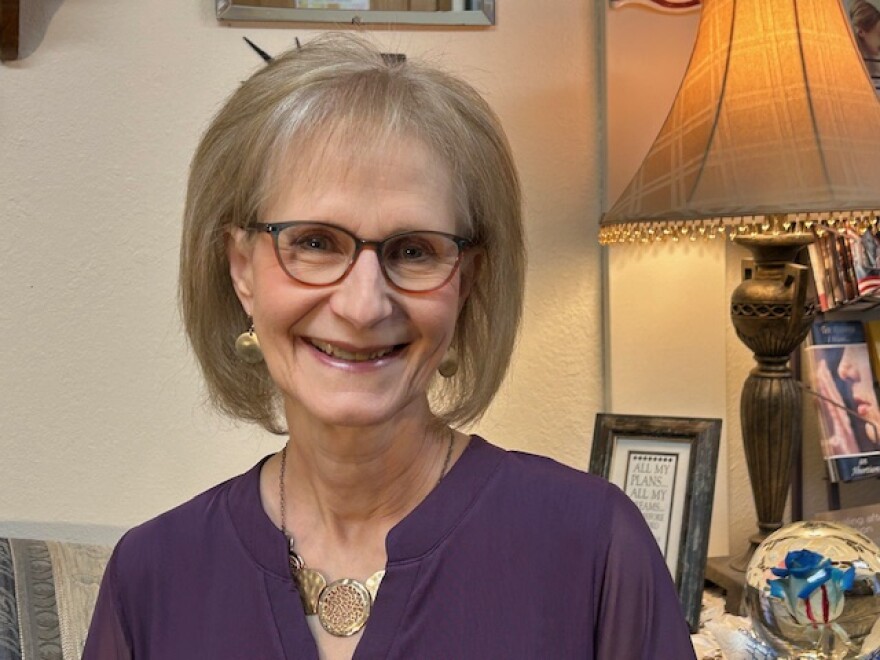For many people, the holidays are both a joyous and stressful time of the year. For individuals with dementia and their families, it can be an especially complex season to navigate.
"There's disruption of routine, lots of people who may be unfamiliar with your loved one's condition converging on a household, pressure to be joyful when caregiving can be exhausting," said Wendy Abbott, a volunteer facilitator with the Black Hills Memory Cafe.
Abbott is also a volunteer with the Alzheimer's Association. Alzheimer's disease is the leading cause of dementia, an umbrella term for neurodegenerative symptoms like memory loss, difficulty communicating and problem-solving, and other cognitive changes that make daily tasks hard to manage.

Even without the added pressures of the holidays, many caregivers are under considerable stress every day. According to data from the Alzheimer's Association, there are 27,000 people who identify as Alzheimer's caregivers in South Dakota. Sixty-one percent of those caregivers are dealing with their own chronic health conditions and 22.2% report experiencing depression.
Those caregivers provide a combined total of 35 million hours of care a year to their loved ones with Alzheimer's, valued at $925 million dollars of unpaid labor.
Jan Bartscher is a volunteer with the South Dakota Chapter of the Alzheimer's Association. Bartscher says for families planning how best to celebrate the holidays, it's important to recognize there's no one size fits all approach.
"Dementia will manifest itself very differently in each person," said Bartsher. "Some people become very agitated with crowds. Other people love crowds while they're dealing with this disease. So the first thing for caregivers to think about is, 'How does my loved one with some sort of cognitive decline, some form of dementia, react to their surroundings?' That's going to help the caregivers think about 'How do I design the holidays?'"
As families plan, an important first step is to be open with visitors about the changes they may expect from the person living with dementia.

"Let them know how the disease is progressing. Let them know what things are comfortable and what are uncomfortable for your loved one. I think that helps those extended family members to be prepared when they come into your home. And it reduces that stress for the caregiver as they do come to visit," said Bartscher.
If you're worried about communicating these updates, the Alzheimer's Association has tips on how to familiarize others with your loved one's condition.
Bartscher also recommends delegating tasks to people outside of the caregiving circle and paring down holiday preparations so they're less complicated.
"I believe caregivers need to realistically say, 'What can I handle?'" said Bartsher.
"Maybe you've always prepared the whole Christmas or Thanksgiving dinner," she continued. "Ask others to make some of those side dishes. It's OK to ask for help and simplify those preparations for yourself. As well as decorating. Maybe you don't put up as many decorations as a caregiver. You need to make the holidays manageable for yourself so you too can enjoy them."
Bartscher says it's also helpful to give friends and family gift ideas that are appropriate for your loved one.
"They might need a little guidance to know that there's certain things that are no longer a part of that person's life, that are no longer meaningful to them," said Bartscher.
"As the disease progresses, some people may find it difficult to unwrap a present," she continued. "So ... maybe in gift giving to someone with some form of dementia, put it in a gift bag. That individual just needs to pull the gift out of the bag and not figure out how to unwrap it."
Routine is also important for people living with dementia and it's recommended to schedule holiday events in a way that isn't disruptive to normal activities. Bartscher says families may also want to avoid scheduling things in the late afternoon and early evening, when some individuals experience "sundowning," a phenomenon where they become more confused and agitated.
"As you're planning the holidays, perhaps with that in mind, plan your gatherings earlier in the day, not in the evening," said Bartscher. "But again, you know your loved one. Plan your celebration for when it's going to be the best time of day for them."
Abbott and Bartscher want families affected by dementia to know there are resources available to help them through the holidays, and beyond. Those resources include the Alzheimer's and Dementia 24/7 Helpline, which can be reached at 1-800-272-3900 and has master level clinicians available to answer specific questions and provide counsel and comfort.
There are also several in-person events where caregivers and their loved ones can decompress and find resources, including the Black Hills Memory Cafe and community support groups across the state.
Additionally, Abbott highly recommends reading "A Simple Tip for Holiday Gatherings" by the nonprofit organization Dementia Together and visiting Dr. Kristie Wood's holiday resource page.
Even with the added stress of the holidays, Bartscher says families can still find opportunities to celebrate and enjoy the time they spend with loved ones.
"I always tell caregivers they're on a very, very devastating and difficult journey, but it's important to look for those small moments of joy every day, and maybe especially around the holidays," said Bartscher. "There's going to be difficult times and maybe there's going to be sadness as you see the disease progressing in your loved one. But make it intentional to look for those moments of joy."


